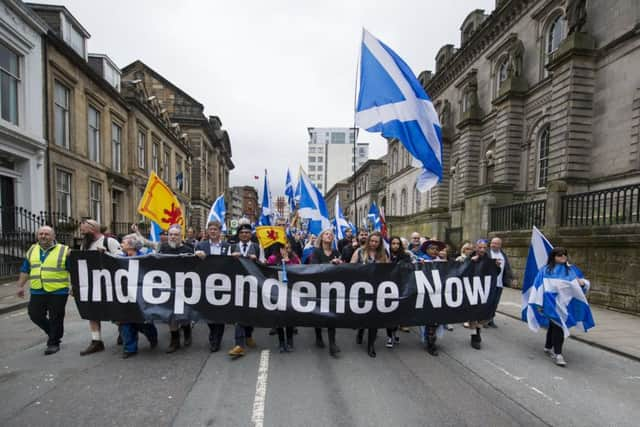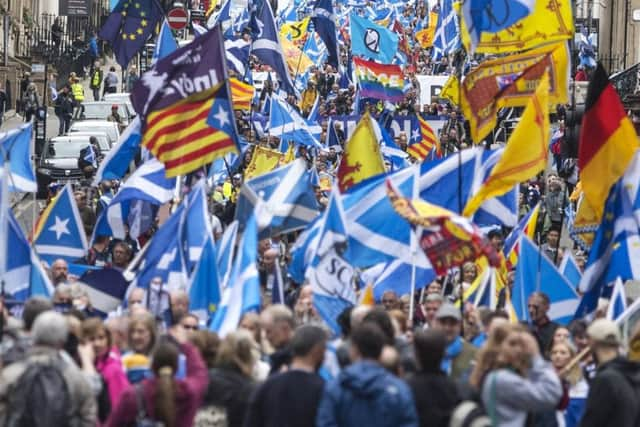Analysis: Why marches are unlikely to lead to Scottish independence
Glasgow is no stranger to public processions or political rallies. From large-scale marches that stop traffic at Charing Cross to impromptu protests confined to George Square, there is a long history of mass demonstration in the city.
Scottish independence is just the latest cause to motivate people to take to the streets. In recent decades, both the anti-poll tax movement and the campaign against the second Iraq war saw thousands brandish placards.
Advertisement
Hide AdAdvertisement
Hide AdIn the age of Instagram, an eye-catching homemade banner can go a long way. The inauguration of Donald Trump as US president in January last year prompted an impressive turn-out in Buchanan Street.


But none of those protests could match the sheer numbers of those involved in the now annual All Under One Banner (AUOB) march on Saturday. Police Scotland conservatively estimated the number of marchers at around 35,000, while some attendees went for a decidedly more optimistic total of 90,000.
Regardless of exactly how many people were waving saltires on Saturday afternoon, that kind of turn-out is impressive for an event that lacks official endorsement from a major party - even if several senior SNP members were in attendance - and relies mainly on Facebook for promotion.
Some commentators have suggested the rise in the number of marchers is further evidence of the huge enthusiasm for IndyRef2 that exists among grassroot supporters of independence.


However, no one in the SNP high command needed a march to tell them this. Nicola Sturgeon and her colleagues are already well aware of what it is their membership craves.
Senior Nationalists also need no reminding of last year’s general election result north of the Border. Yes, the SNP returned 35 MPs - their second-highest total on record. But the party also lost in 21 constituencies it had won at a canter just two years previously. It also came perilously close to losing several more, particularly in Glasgow, with majorities in the thousands slashed in some cases to just a handful of votes.
The 2017 AUOB march took place on the Saturday before polling day in June. Some observers commented at the time that the marchers may have been better off campaigning for their chosen candidates, rather than drawing attention away from Theresa May’s government and back to the constitutional debate.
For every voter animated by the prospect of independence, another is likely to roll their eyes.
Advertisement
Hide AdAdvertisement
Hide AdDespite the uncertainty of recent times, it remains unlikely the Scottish electorate will be asked to return to the polls this year, so we will be unable to judge the impact of this year’s march in terms of votes won or lost.
But a visit to the impartial What Scotland Thinks website offers a sobering reminder to indpendence supporters of how much work they face in order to win any future IndyRef2.
If a plebiscite was held next week, all recent opinion polls suggest the result would be much the same as it was in September 2014. Support for independence has been bumping along at around 45 per cent, while support for the Union generally remains above 50 per cent, including those who refuse to make a preference when asked by pollsters.
Strip out the don’t knows, and the Yes campaign hasn’t reached 50 per cent or above since March 2017. It wasn’t so long ago that some Nationalists were talking of not staging IndyRef2 until the Yes vote was polling in excess of 60 per cent.
Of course, with the UK’s departure from the European Union proving to be a bumpy ride so far, those figures could change.
There are many in the SNP who remain convinced that Brexit offers the ideal opportunity for an IndyRef2. Others urge caution.
Noel Dolan, a key adviser to Nicola Sturgeon for more than a decade, this weekend warned the SNP should focus on “the main event - Brexit - and not on the consequences.”
Nationalists will gather in Aberdeen next month for the SNP’s spring conference. Those who marched on Saturday will be hoping it marks the start of another referendum campaign. They may be quick to voice their disapproval of the leadership if it does not.
